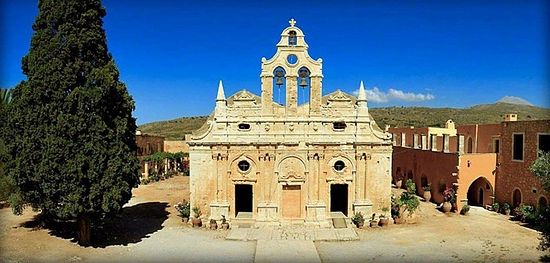Source: The Pappas Post
November 9, 2016
One of the bloodiest events in modern Greek history took place at the historic Monastery of Arkadi in central Crete when rebels and almost a thousand men, women and children were hunkered down within the monastery walls, surrounded by 15,000 Ottoman Turkish soldiers who were sent to stop a revolt in the region.
The monastery walls were manned by only 259 armed men— Cretan revolutionaries, including 45 monks almost 700 women and children from nearby villages, seeking refuge from the encroaching Turks.
The Turkish commander demanded surrender at the monastery walls. The Cretans responded with gun fire.
The bloody battle was on and soon, the monastery gates were stormed and a violent battle ensued.
The numbers were overwhelming and eventually, all of the Cretan rebels were killed, leaving about 700 helpless women and children holed up inside a storage room inside the monastery compound that was usually used for olive oil and food— but since the revolt, was a storage room for gun powder and explosives.
Soon the Turkish soldiers surrounded the massive warehouse that was filled with people and at the most opportune moment, a rebel by the name of Konstantinos Giaboudakis who was inside the room gathered the consensus of all inside to do the unthinkable— ignite the gun powder and die, en masse, as free Greeks.
The ensuing explosion also killed more than 1500 Ottoman soldiers
The desire of the Cretan villagers to die as free Greeks and the actions of the Turks shocked the world’s public opinion and brought focus on the Cretan struggle for independence.
Philhellenic volunteers began arriving on Crete from Serbia, Hungary, Italy— and a Frenchman named Gustave Glourens— so moved by the freedom-yearning Cretans enlisted in their rebel army and organized a small group of foreign rebel fighters, including three other Frenchmen, an Englishman, an American, an Italian and a Hungarian. This group published a brochure on The question of the Orient and the Cretan Renaissance, contacted French politicians and organized conferences in France and in Athens.
Giuseppe Garibaldi, in his letters, praised the patriotism of the Cretans and their wish to gain their independence. Numerous Garibaldians, moved by an ardent philhellenism, came to Crete and participated in several battles.
Letters written by Victor Hugo were published in the newspaper Kleio in Trieste, which contributed to the worldwide reaction. The letters gave encouragement to the Cretans and told them that their cause would succeed.
Not finding the necessary solution from the big European powers, the Cretans sought aid from the United States. The American public was sympathetic toward the Cretan cause and many American philhellenes joined the cause of Cretan independence.
In 1868, a question of recognition of independent Crete was addressed in the House of Representatives, but it was decided by a vote to follow a policy of non-intervention in Ottoman affairs.

